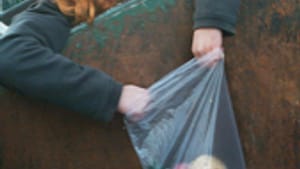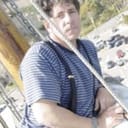Stay in the Loop
BSR publishes on a weekly schedule, with an email newsletter every Wednesday and Thursday morning. There’s no paywall, and subscribing is always free.
The life of a bugout

If you build it, we won't come
ROB LAYMON
I feel like I’ve betrayed my country. For the last ten years I’ve basically wandered, never holding a full-time job. I produce very little, costing the economy perhaps $100,000 in lost wages every year. By necessity, but also by choice, I rarely buy anything that I might otherwise borrow, trade for, or find used. If we slip into recession, it will be my fault.
I left my last full-time job ten years ago and considered time to be my wealth. I had various reasons: dislike of waste, of wasted effort, of the harness, of pollution. Every chance to hold a full-time conventional job, to re-enter that grand concourse of the respectable, I have refused.
I’ve been fairly successful as an idler. Part-time and contract writing jobs have kept me alive, though I live on very little. I realize this sounds sad in print; but I’m much happier now than when I was productive. I’ve never felt more vital.
From your perspective, here’s the scary part: I’m not alone. Since I joined the ranks of the unproductive, I have seen those ranks grow— well educated, non-poverty-stricken people choosing to not get and not spend. Think of that: an exodus of purchasing power from the marketplace, also of work skills and brain.
With a little help from the Internet
In the last five years, non-monetary commerce has grown rapidly around the country, thanks largely to the ease of online community building. Websites and list servers like Freecycle have given ordinary computer users the power to acquire and dispose of goods in an entirely moneyless environment. Simply sign on to the list server— there are several around Philadelphia— and be apprised of every free item available from other members of the group. Or post your own.
Members of a group (movement? Fringe cluster?) called Freegans are now making almost a moral point of acquiring as little as possible through ordinary monetary payments.
Rather, they devote their economic lives to obtaining necessities free of charge whenever possible. This means they visit rummage sales, cadge cast-off items from friends and family, haunt thrift stores, and even scrounge in grocery store dumpsters for food— food often thrown out because it’s close to its expiration date.
A compact to buy nothing
In December 2005 a circle of friends in San Francisco dared each other to spend a year without purchasing new merchandise besides food, underwear and crucial safety items like windshield wiper blades. They would buy nothing unnecessary and renounce shopping as recreation. They would keep to thrift stores, use Freecycle, lend and borrow among themselves.
In a year, what started with ten friends in San Francisco grew to tens of thousands around the world. They call themselves compacters, since they abide by a compact of anti-consumerism, and now have beachheads in most U.S. cities, including Philadelphia.
Ten years ago, the anti-consumerist magazine Adbusters operated in debt with a circulation of several thousand. Today it has a newsstand circulation of more than 100,000—70% of its readers are newsstand buyers— and publishes in the black, without any advertising. (The magazine does derive money from sales, but much of its work is done by volunteers. Its founder and publisher, Kalle Lasn, is the man who invented Buy Nothing Day, an annual holiday observed on the day after Thanksgiving by avoiding purchases of any kind.)
My own survival hasn’t been easy, but I’ve enjoyed myself tremendously. I don’t admit to strangers I’m a bugout, however— people have no idea how to respond to the happy jobless. And bugouts can get preachy and insufferable. So I say I’m a “writer.”
My favorite job
It took me five years to work upward from listless affluence to a state of enjoyable poverty, pursuing a variety of interests—sailing, writing, travel— rather than just one. No, I don’t have kids, never married, which I know makes a big difference. But I do have plenty of young people in my life. I work for various sailing programs around the country, the ones designed to teach kids about self-responsibility and being good shipmates. (“Teamwork” is really so inadequate to describe the group coordination necessary to sail a ship and keep everyone alive.) Aside from the good vibes, this work brings me room, board and between $600 a month and $600 a week.
I introduce young people to adventure and faith in their own strength. I’m abetted in this work by the sailing environment itself, which requires and rewards mental and physical agility. I take kids whose parents won’t let them ride a bicycle and watch them climb into the sky on a mast. It’s fair to say this career option didn’t appear on the vocation questionnaires I filled out in high school.
Now, nearing 50, I spend most of my time outdoors, often doing extremely hard physical work. I have no time off, and then I have too much. Some day I may earn more than $10,000 a year again. But there must be an economy out there that traffics in a broader range of values, not just dollar values.
I don’t know where it’s all going. I remain very happy to live in a country where I can pursue such a life, filled not only with time, study and stimulation, but all the goods a first-rate economy can provide. Oh, yes— I love the fruits of advanced civilization as much as anyone. That I can live on its periphery, almost on its offscourings, makes me love it even more.
To read responses, click here and here.
ROB LAYMON
I feel like I’ve betrayed my country. For the last ten years I’ve basically wandered, never holding a full-time job. I produce very little, costing the economy perhaps $100,000 in lost wages every year. By necessity, but also by choice, I rarely buy anything that I might otherwise borrow, trade for, or find used. If we slip into recession, it will be my fault.
I left my last full-time job ten years ago and considered time to be my wealth. I had various reasons: dislike of waste, of wasted effort, of the harness, of pollution. Every chance to hold a full-time conventional job, to re-enter that grand concourse of the respectable, I have refused.
I’ve been fairly successful as an idler. Part-time and contract writing jobs have kept me alive, though I live on very little. I realize this sounds sad in print; but I’m much happier now than when I was productive. I’ve never felt more vital.
From your perspective, here’s the scary part: I’m not alone. Since I joined the ranks of the unproductive, I have seen those ranks grow— well educated, non-poverty-stricken people choosing to not get and not spend. Think of that: an exodus of purchasing power from the marketplace, also of work skills and brain.
With a little help from the Internet
In the last five years, non-monetary commerce has grown rapidly around the country, thanks largely to the ease of online community building. Websites and list servers like Freecycle have given ordinary computer users the power to acquire and dispose of goods in an entirely moneyless environment. Simply sign on to the list server— there are several around Philadelphia— and be apprised of every free item available from other members of the group. Or post your own.
Members of a group (movement? Fringe cluster?) called Freegans are now making almost a moral point of acquiring as little as possible through ordinary monetary payments.
Rather, they devote their economic lives to obtaining necessities free of charge whenever possible. This means they visit rummage sales, cadge cast-off items from friends and family, haunt thrift stores, and even scrounge in grocery store dumpsters for food— food often thrown out because it’s close to its expiration date.
A compact to buy nothing
In December 2005 a circle of friends in San Francisco dared each other to spend a year without purchasing new merchandise besides food, underwear and crucial safety items like windshield wiper blades. They would buy nothing unnecessary and renounce shopping as recreation. They would keep to thrift stores, use Freecycle, lend and borrow among themselves.
In a year, what started with ten friends in San Francisco grew to tens of thousands around the world. They call themselves compacters, since they abide by a compact of anti-consumerism, and now have beachheads in most U.S. cities, including Philadelphia.
Ten years ago, the anti-consumerist magazine Adbusters operated in debt with a circulation of several thousand. Today it has a newsstand circulation of more than 100,000—70% of its readers are newsstand buyers— and publishes in the black, without any advertising. (The magazine does derive money from sales, but much of its work is done by volunteers. Its founder and publisher, Kalle Lasn, is the man who invented Buy Nothing Day, an annual holiday observed on the day after Thanksgiving by avoiding purchases of any kind.)
My own survival hasn’t been easy, but I’ve enjoyed myself tremendously. I don’t admit to strangers I’m a bugout, however— people have no idea how to respond to the happy jobless. And bugouts can get preachy and insufferable. So I say I’m a “writer.”
My favorite job
It took me five years to work upward from listless affluence to a state of enjoyable poverty, pursuing a variety of interests—sailing, writing, travel— rather than just one. No, I don’t have kids, never married, which I know makes a big difference. But I do have plenty of young people in my life. I work for various sailing programs around the country, the ones designed to teach kids about self-responsibility and being good shipmates. (“Teamwork” is really so inadequate to describe the group coordination necessary to sail a ship and keep everyone alive.) Aside from the good vibes, this work brings me room, board and between $600 a month and $600 a week.
I introduce young people to adventure and faith in their own strength. I’m abetted in this work by the sailing environment itself, which requires and rewards mental and physical agility. I take kids whose parents won’t let them ride a bicycle and watch them climb into the sky on a mast. It’s fair to say this career option didn’t appear on the vocation questionnaires I filled out in high school.
Now, nearing 50, I spend most of my time outdoors, often doing extremely hard physical work. I have no time off, and then I have too much. Some day I may earn more than $10,000 a year again. But there must be an economy out there that traffics in a broader range of values, not just dollar values.
I don’t know where it’s all going. I remain very happy to live in a country where I can pursue such a life, filled not only with time, study and stimulation, but all the goods a first-rate economy can provide. Oh, yes— I love the fruits of advanced civilization as much as anyone. That I can live on its periphery, almost on its offscourings, makes me love it even more.
To read responses, click here and here.
Sign up for our newsletter
All of the week's new articles, all in one place. Sign up for the free weekly BSR newsletters, and don't miss a conversation.

 Rob Laymon
Rob Laymon